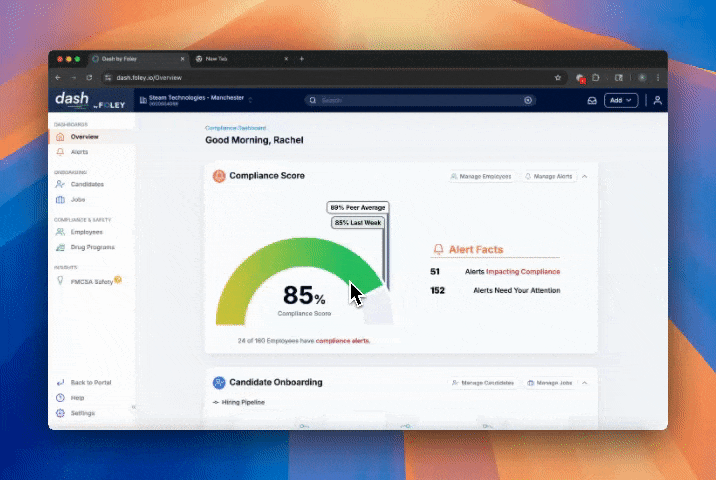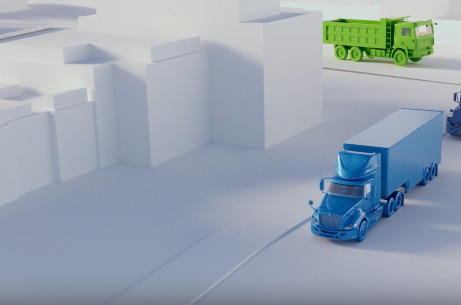Non-Domiciled CDLs Under the New FMCSA Rule: What It Means for Your Fleet

As of September 29, 2025, the Federal Motor Carrier Safety Administration (FMCSA) put new restrictions in place for non-domiciled commercial driver’s licenses (CDLs) and permits (CLPs) — licenses issued to individuals whose permanent home is outside the United States.
The rule significantly tightens eligibility and renewal requirements, creating new challenges for drivers who are not U.S. citizens or permanent residents and the fleets that employ them. This article provides a simple explanation of what's changed and what it may mean for you and your team.
What Changed
-
Eligibility is narrower: Only individuals on H-2A (temporary agricultural workers), H-2B (temporary non-agricultural workers), or E-2 (treaty investors/employees) visas can now qualify for a non-domiciled CDL/CLP.
-
Shorter license terms: Non-domiciled CDLs/CLPs can only be issued for a maximum of one year, tied to the driver’s immigration record.
-
More documentation required: A valid passport and I-94 record are required every time a non-domiciled CDL/CLP license is issued, renewed, or upgraded.
-
Renewals must be in person: No more online or mail renewals for non-domiciled CDL/CLP holders.
-
Stricter state oversight: Licensing agencies must verify status through the Department of Homeland Security’s SAVE system, clearly mark the CDL/CLP as “non-domiciled,” and keep additional records for federal audits.
Why This Matters for You
-
Some drivers may already be losing eligibility, creating workforce gaps.
-
Renewal delays can disrupt dispatch schedules and productivity.
-
Compliance failures could result in fines or harm your safety rating if an ineligible driver operates a vehicle.
Related guide: Compliant Driver Qualification Files (DQFs) Made Simple
5 Steps to Protect Your Fleet Under the FMCSA’s New CDL Rule
-
Audit Your Current Drivers - Immediately review which drivers hold non-domiciled CDLs.
-
Confirm Visa Categories - Verify if those drivers fall under H-2A, H-2B, or E-2. If not, plan for replacements.
-
Track Expiration Dates - Review CDL, passport, and I-94 expiration dates — knowing renewals are stricter and must be in person.
-
Tighten Compliance Processes - Ensure your Driver Qualification File (DQF) system is capturing required documents and alerting you before expirations. Continuous MVR monitoring is essential for flagging suspended or revoked licenses, so you can take immediate action.
-
Work With a Compliance Partner - Partner with a compliance expert to monitor, alert, and prepare your files for audits so you can avoid disruptions.
Learn Why Continuous MVR Monitoring Isn't Optional for Employers in 2025
How Foley Can Help
At Foley, we keep our customers ahead of the compliance curve and provide peace of mind knowing there will never be any surprises. With the new FMCSA rule now live, our all-in-one hiring, compliance, and monitoring platform can help you:
-
Hire Qualified Drivers Faster with streamlined applications and automated screenings
-
Track Driver Credentials through our DQF Management system and continuous monitoring.
-
Get Real-Time Alerts before items like licenses or medcards expire.
-
Stay Audit-Ready with centralized, compliant document storage.
-
Reduce Workforce Risk by identifying drivers who have suspended or revoked licenses.
Bottom line: The rule is active, and the impact is real. Foley ensures your business is protected and your fleet keeps moving. To learn more about Foley's driver management and proactive compliance monitoring solutions, reach out to speak with a specialist.
Related Articles
Learn Five Steps to Querying the FMCSA Drug & Alcohol Clearinghouse
New Study Makes Argument for DOT Hair Testing
November 2024: What's New in Safety & DOT Compliance
.png)


